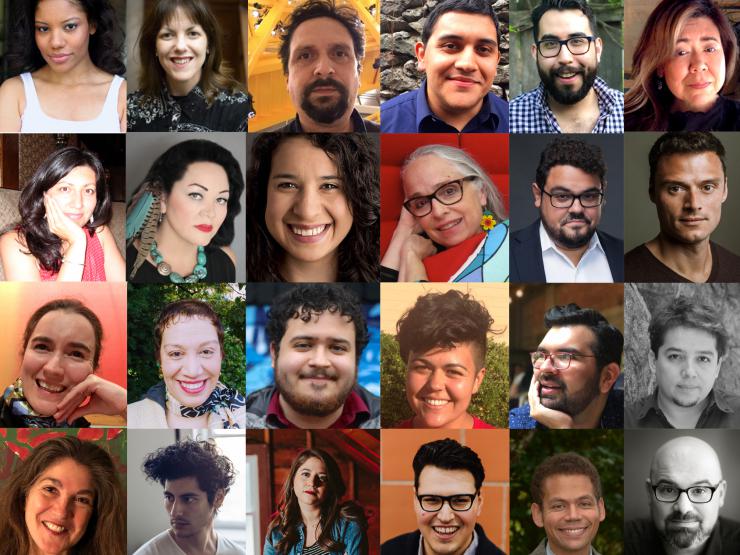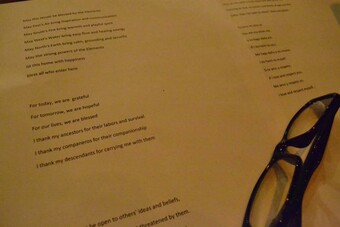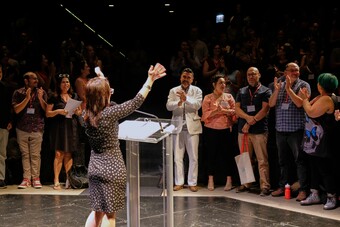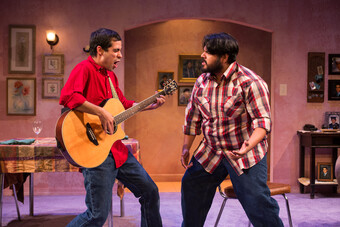ConeXión! The LTC Announces Twenty-four New Latinx Plays as Finalists for Carnaval 2018
We’re at it again! The Latinx Theatre Commons (LTC) will host our 2018 LTC Carnaval of New Latinx Work 19-21 July 2018 in Chicago, IL. Catch up on the origin story of the 2015 LTC Carnaval.
What’s the same: Carnaval 2018 will be produced in association with ALTA Chicago and Teatro Vista, hosted by The Theatre School at DePaul University, and feature a treasure trove of new Latinx work.
What’s new: Carnaval 2018: ConeXion! will focus on six new Latinx plays with each play serving as a nexus through which to connect with six Latinx writers, six Latinx directors, six Latinx dramaturgs, twelve Latinx designers, and one of the strongest Latinx acting pools in the nation! Additionally, participants will be welcomed into Chicago’s rich Latinx theatre community through events created by our partners Urban Theater Company, Aguijón Theater, Teatro Vista, and the Chicago Latino Theater Alliance.
But, wait, Carnaval 2018 will feature only six plays?!
By now (three years after Carnaval 2015) you all know the field is much richer, and you are right! The selection process has been grueling. This year the selection committee (listed below) received over 125 submissions. Each of those plays was read by two different committee members. Using a rigorous evaluation rubric, the original pool was reduced to fifty-eight projects. Each of those fifty-eight plays was read by two more selection committee members, put through the same evaluation process, and discussed extensively by the full committee.
We are now pleased to announce twenty-four finalists for Carnaval 2018. These plays represent a snapshot of Latinx theatre in the United States today: bold, current, smartly crafted, sometimes elegiac, often naughty. From recent grads to mid-career and on to our veteranxs, these writers speak to and beyond this complex moment in our nation’s history.
These plays represent a snapshot of Latinx theatre in the United States today: bold, current, smartly crafted, sometimes elegiac, often naughty.
If you are looking for new Latinx work, you’ve come to the right place. If you want to read these plays and/or want to see six of these plays on their feet and/or want to connect with an incredibly assembly of Latinx talent and/or want to participate in a thriving Latinx theatre community, join us and create your ConeXión! To attend the 2018 LTC Carnaval, read the Participant Application Guidelines and then apply here. The LTC is accepting applications to attend until 13 May 2018 @ 11:59pm PDT and will notify you of your participation by 18 May 2018.
The finalists for the 2018 LTC Carnaval of New Latinx Work are:
(w)holeness by Lily Padilla
The support group for sex addicts meets every Monday in the little seaside town of Pescadero, California. But where is Dr. Jurgensen, the therapist who’s supposed to lead the group? And is Dr. Jurgensen’s earnest intern who's left to lead the group in over her head? When Matt shows up, any illusion of a “safe space” shatters and the group must confront difficult truths and unexpected points of connection in a comedy about addiction, identity, and sex. (w)holeness asks the question: “Am I too damaged to be loved?”
Beige by Desi Moreno-Penson
Winner of the 2016 National Latino Playwriting Award sponsored by the Arizona Theater Company, Beige is set in 2001 soon after the tragedy of 9/11 and tells the story of Soledad Iglesias, a young Nuyorican journalist who finds herself caught between the reality of her Jewish fiancé and the ideals of the infamous Puerto Rican Nationalist Lolita Lebron. Existing at the crossroads of history, reality, and cultural imagination, Beige is a cautionary tale of race, Puerto Rican politics, and love.
Dragón by Duran Arturo Lucio
Dragón is an all-female Chicano drama centered around the Guzman family: Regina, her wife Miranda, and their two daughters, Charlie and Laura. With Regina’s deteriorating memory, some lifelong secrets begin to emerge. The family must now navigate and put out the (sometimes literal) fires Alzheimer’s Disease has brought upon this once semi-peaceful family.
Erased by Magdalena Gómez
A “poetic imagining” of the life and motivations of the autodidactic scholar and bibliophile, Arturo Alfonso Schomburg, this play moves along an imaginary timeline and pretends no historical accuracy. It is a tribute portrait of one of our Afro-Boricua heroes, conjuring imagined details of the struggles he faced, the loves of his life, and the people who influenced and inspired him to gather evidence of the massive contributions to society by those of African descent.
Faith by Lee Osorio
Faith explores how we justify our silence and inaction. After the death of her mother, Faith spirals into a pattern of compulsive eating and driving until the pattern is broken by the arrival of Theo. The strange new worker offers her hope that the future holds more for her than working in the Ingle’s deli department for the rest of her life. Faith knows there’s something lurking beneath the surface, but doesn’t understand what it is until she gets pregnant. How much is Faith willing to sacrifice to keep her world intact?
Feliz by Michael Mejia
Feliz follows Augusto and his family as they struggle to keep their Christmas merry. As the house closes in on the family, growing inconsistencies become harder to sweep under the rug once a public controversy comes to light. Inspired by the Book of Revelation, Feliz asks the question—are we defined by our secrets?
Fuel by Caridad Svich
You live in a place that reeks of gasoline. You run on fuel. You don’t know anything else except living hard and surviving, but one day that fuel is gonna run out. How are you gonna know who you are, then? This is the story of Baby and their people living in a town left for dead. This is also the ballad of Baby and Girl in this here mad America.
Getting There by Janis Astor de Valle
Getting There is a solo piece in which witnesses, victims, and perpetrators grapple with violence and its impact upon their lives. Some try to ignore the violence, while others seek revenge, or rally for peace and justice. Regardless of how everyday people cope, they help us to understand that no one’s born holding a gun—they get there.
Golondrinas by Irma Mayorga
Beginning in 1940s Mexico and landing in the Chicano Movement of the 1970s, Golondrinas follows the courageous life stories of Amada—who escapes a brutal first marriage in Mexico, migrates to Texas, and marries Lázaro, a subsistence farmer—and her US-born daughter Lucero. The family’s impoverished, rural life illustrates the tenacity needed to survive in anti-Mexican, mid-twentieth century Texas; Amada and Lázaro’s bitter marriage illustrates the more intimate battles Tejana women fought. While tracing Amada’s story, the play also unearths and dramatizes the devastating migration histories of Amada and Lázaro’s extended families. By unfolding one Mexican American family’s history between Mexico and the US, Golondrinas gives dramatic voice to land, love, and loss in Tejanxs’ lives in the twentieth century.
How the Colds Were Razed by Cristina Florencia Castro
In the Cold family, no one dies by natural means. Members name their Death Day—an event in which family bids and fights for the right to kill the "Honored One." Six generations of this macabre tradition culminate in the Death Day of Richard "Solo" Cold, who is to give his life to one of only three remaining family members: the children of his deceased sisters—Fourth, Wrench, and Matter. A dark comedy set in a candlelit world of violence and secrets, Solo's DEATH DAY is witnessed by his dog, Gorilla Girl. A story about that inescapable, undefinable, and completely terrible tie between people: family.
Killing of a Gentleman Defender by Carlos Murillo
In 1994, the world was shocked when International soccer star Andres Escobar was gunned down in Medellin, Colombia following his disastrous own goal at the FIFA World Cup USA. In 2015, Martin, an ambivalent teaching artist in Chicago hired to create a play about violence in Chicago with youth from the violence-plagued neighborhoods of the city finds himself caught between his boss' desire for a docudrama and his own belief in metaphor. Martin unearths the Escobar story from the past to tell a city's story in the present leading to tragic consequences.
Milton, MI by Paz Pardo
Leah’s got writer’s block, Amber’s got Ambition, Jake’s got it all (including your regular fear of slugs). Jake and Leah were hot-shot young poets when they left NYC for Jake’s professorship at Milton Tech, but now Leah’s working admin as Jake’s career skyrockets. So when fresh-faced Amber shows up, it’s only a matter of time before things get sticky. A play about threesomes, poetry, and slugs.
My Father’s Keeper by Guadalís del Carmen
My Father’s Keeper is about family and the secrets we keep to protect our loved ones. Tirsio Armando Gonzalez and his wife Juana are the pillars of their community in the Dominican Republic and in their new home in Chicago, but Tirsio’s sudden death causes family secrets to come to light. Dealing with the their father’s truth and double life, Mondo and Sofía must learn to lean on each other like never before while figuring out how to best honor their father. The Gonzalez family must define what secrets are worth keeping and which ones aren’t worth the trouble.
Our Dear Dead Drug Lord by Alexis Scheer
Our Dear Dead Drug Lord follows a gang of teenage girls, the members of The Dead Leaders Club, who’ve just been formally disbanded by school administration for misappropriating school funds…and worshipping Pablo Escobar. Taking refuge in a treehouse, the girls try to resurrect the spirit of Pablo. But are they just messing with each other, or could they actually be messing with a higher spirit?
Princess Clara of Loisaida by Matt Barbot
With Mamá long gone and Papá catatonic (and only able to sing old sitcom theme songs), aspiring baseball player and high school super-senior José finds himself in charge of his video game obsessed little sister, Clara. Scraping by together on the Lower East Side, the siblings stay distracted from their bleak reality through José’s fanciful stories. When José discovers the fairy tales he’s been telling might be true—that she was a fairy princess of a magical realm, left in Central Park for their parents to find—he is forced to fight a magical battle for her destiny.
Queen of the Rumba by Josefina Lopez
Queen of the Rumba is inspired by the true story of Rumba Queen Alicia Parla who, at twenty-one, set the world on fire with her erotic dance moves. This dramedy centers around Alicia in a cancer ward telling her story to a young woman who has been given a death sentence. She recalls how she tried to be the perfect daughter while pursuing her dream of being a dancer, teaching her that it’s not about how much time you have, but what you do with your time.
querencia by Benjamin Benne
What's a boy to do when his favorite fruit is banana in a world that says he's gotta love mangoes? "querencia" (a Spanish word having to do with the longing to find or return to a place that feels like home) is a magical coming-of-age story about a young boy named Milo’s search for belonging as he grapples with friends, family, and his sexual identity, guided by a mysterious character called La Bruja.
Richard & Jane & Dick & Sally by Noah Diaz
The classic “Dick & Jane” characters from the ubiquitous 1950s children’s readers are grown up and struggling to stay afloat in a home fractured by grief. Dick (now going by Richard) is raising his two children, Dick Jr. and Sally, who is deaf, while trying to hide a terminal sickness from them that will inevitably leave them orphans. He calls home his estranged sister, Jane, in attempt to reconcile and make peace with their shared history before he passes away. Richard & Jane & Dick & Sally is a new kind of family drama about deafness, identity, and generational sadness, with ghosts, talking dogs, sign language, and Snickers bars.
Seeing Eye by Nick Malakhow
Jason, a blind man, meets the troubled and charismatic Robbie outside of a gay bar one night and initiates a week-long romance. Throughout their courtship, Jason struggles to break free from his self-consciousness and timidity, as well as from the watchful eye of his overprotective sister, Jordan, who is herself angling for independence and a fresh start.
Shoe by Marisela Treviño Orta
In the sixteen years since her father left, Marta has felt trapped in her family's double-wide in Texas. She gave up college and stayed home to take care of her siblings and mother. Just as a secret online relationship reignites Marta's dreams and curiosity about the world outside, her siblings each decide they will do anything it takes to escape their home lives—even if it means leaving Marta behind.
Soda From Water Cups by Jaymes Sanchez
After a police officer kills his brother, Joe, an introverted mixed-race young man makes attempts at positive emotional recovery, while also secretly desiring revenge. Throughout the play, Joe uses his phone as a remote control to the universe, orchestrating the flow of the play, bringing social media to the stage, playing and replaying important moments, and pausing scenes to comment upon the gravity of certain actions. The play explores grief and the damage caused by snap-judgments, and it asks whether full recovery from the traumas of urban life is possible in a world where these snap-judgments cause state-sponsored violence.
The Corrido of the San Patricios by Beto O’Byrne
The Corrido of the San Patricios tells the story of the battalion of approximately 200 United States soldiers, mostly Irish immigrants, who defected from the U.S. army to fight for Mexico in the Mexican American War. Los San Patricios fought in the toughest battles during the U.S. invasion of Mexico, played a critical role in the military conflict that shaped a continent, and their tragic end—when 50 of their members were executed by the US Army—remains the largest mass execution in US military history. This play with music looks at this mostly-forgotten historical event through a 21st Century lens, and uses era-inspired music from Mexico, Ireland, and the U.S. to share this highly relevant story for today’s audiences.
three girls never learnt the way home by Matthew Paul Olmos
Three high school girls are bused into a neighboring affluent town as part of a controversial school integration program. However, a mysterious encounter sends a panic through both towns.
Tribe of the Brightest Sun by Carl(os) Roa
Tribe of the Brightest Sun is a piece of trash. It is also a collection of vignettes depicting the existences of Iris, Judy, and Sunshine. Within their acropolis of garbage, the three women grapple with their isolation, fake acid tabs, finding beauty within filth, and most importantly: the sun.
The 2018 LTC Carnaval of New Latinx Work Selection Committee includes:
Dr. Patrice Amon
Dr. Trevor Boffone
David Mendizábal
Regina Garcia
Adriana Gaviria
Isaac Gomez
Dr. Brian Herrera
Alex Meda
Daniel Penilla
Richard Perez
Lisa Portes
Mario Ramirez
Jelisa Robinson
Daphnie Sicre










Comments
The article is just the start of the conversation—we want to know what you think about this subject, too! HowlRound is a space for knowledge-sharing, and we welcome spirited, thoughtful, and on-topic dialogue. Find our full comments policy here
So honored to be a part of this list!